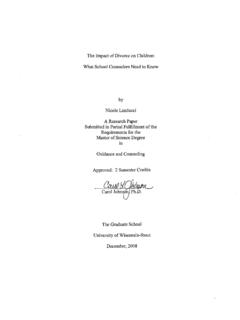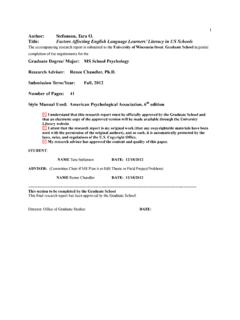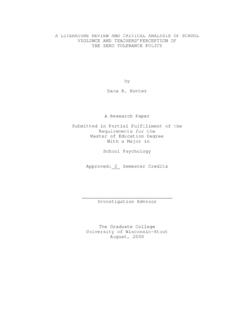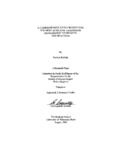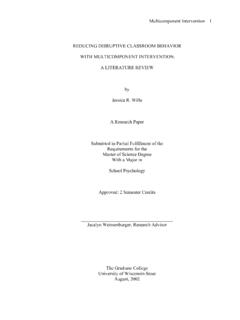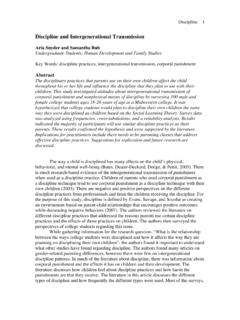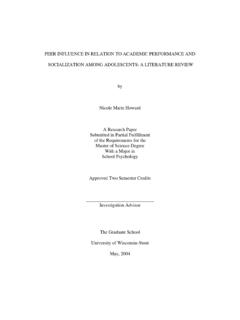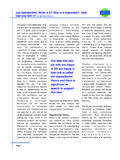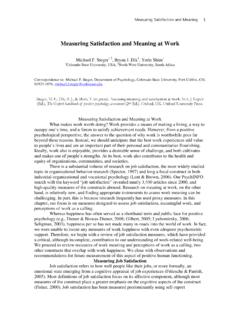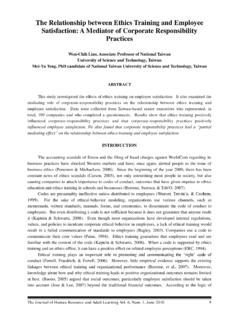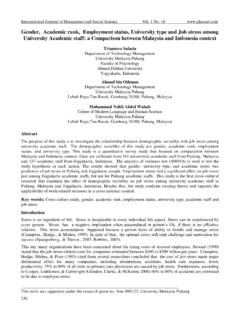Transcription of Morale and Job Satisfaction Focus Group and …
1 1 Morale and Job Satisfaction Focus Group and interview Report 6/6/2006 Report prepared by: Budget, Planning and Analysis Institutional Research Contact: Meridith Wentz Wendy Knutson Tammy Cutsforth EmmaLee Ericksen Susan Greene Survey developed by: Morale and Job Satisfaction Task Force Meridith Wentz, chair Report Prepared for: Morale and Job Satisfaction Task Force Sponsors Chancellor Sorensen, Julie Furst-Bowe, Diane Moen Distribution of report: Committee sponsors, participants, Strategic Planning Group , UW-Stout campus 2 Acknowledgements: The Morale and Job Satisfaction Task Force would like to thank everyone who helped to produce this document. Contributors include: Morale and Job Satisfaction Task Force: Meridith Wentz, chair Bob Johnson Susan Collie James Tan Tammy Cutsforth Holly Teuber Kari Dahl Joan Thomas Woody Haid Donna Weber Committee sponsors: Chancellor Sorensen Diane Moen Julie Furst-Bowe Authors of the report.
2 Meridith Wentz EmmaLee Ericksen Wendy Knutson Susan Greene Tammy Cutsforth Data analysis: Tammy Cutsforth Jim Lenio Wendy Knutson EmmaLee Ericksen Meridith Wentz Susan Greene Randy McCarthy Facilitators/Assistant Facilitators: EmmaLee Ericksen Jim Lenio Jeff Gianforte Jennifer Pauly Susan Greene Angie Przybylski Rebecca Humphrey Josh Weiler Transcribers.
3 Abby Laib Kari Kalogerson Kelly Bender Jim Lenio Rebekah Colianni Lana Landon Theresa Collis Randy McCarthy Alex Etzel Angie Przybylski Ashley Juleff Assistance with project organization: Angie Przybylski Jim Lenio 3 Funding: Chancellor Sorensen Assistance with finding facilitators, assistant facilitators, transcribers and students to help with the analysis: Jane Henderson Joan Thomas Lou Milanesi Julie Zack James Tan Also thanks to everyone who participated in the Focus groups and interviews.
4 These individuals cannot be mentioned by name due to promises of confidentiality but we really appreciate your input in the process! 4 Job Satisfaction and Morale Focus Group / interview Project Executive Summary The following summary highlights the results from the Job Satisfaction and Morale Focus Group and interview project conducted in spring 2006 by the Morale and Job Satisfaction Task Force. The project included 104 randomly selected faculty/staff with at least 20 people per employment category. A total of 60% of the faculty/staff that were contacted actually participated in the study. NOTE: Many specific examples of comments and concerns associated with each of the themes and sub-themes were provided during the sessions. Some of these examples are included in this report. However, Appendix D includes a comprehensive listing of all comments within each theme and sub-theme (edited for confidentiality).
5 Readers are encouraged to read the appropriate sections of the appendix for more details. The authors believe the data support the following general conclusions: Results were analyzed to identify major themes. The following major themes were identified (listed in order of most common to least common): bureaucracy/processes; relationships; equity; workload; support; trust; physical facilities; what can I do; public perception; overall Satisfaction ; communication; recognition; no one listens; and appreciate opportunity to participate. The most common themes are described below. The theme bureaucracy/processes included comments about: the need to improve our program array and quality of programs; comments about administration; the need to improve the hiring, renewal and promotion process; micromanaging; the need to ask for input and use that input, the state budget situation and the polytechnic initiative.
6 Comments in this theme were mostly negative. The theme relationships included comments about the need for collaboration across units. It also included comments about the relationship between faculty/staff and these groups: students, supervisor, department, administration and the external community. Comments in this theme were a mix of positive and negative. Some patterns were also observed throughout the discussions: Most often (but not always) participants provided many examples of things they are unhappy with about their current job and things they would change if they had the power. However, when asked at the end of the session about their overall job Satisfaction , most participants reported high levels of Satisfaction . When asked about the job Satisfaction and Morale of other faculty/staff on campus, there was the perception that job Satisfaction and Morale in other departments or units was lower than their personal job Satisfaction .
7 Participants had no problems coming up with things they would do if they had the power, but had more difficulties coming up with what they could do as an individual to improve their situation. Many said they could do nothing. However, in many cases, they later provided examples of instances where they were proactive and spoke up about their concerns. 5 Sub-themes were identified underneath each major theme. The most common sub-themes were hiring, renewal and promotion process; relationships between faculty, staff and students; relationships between faculty, staff and department; compensation; physical facilities-office space; and perception of own job and others: Comments about the sub-theme of hiring, renewal and promotion dealt mostly with the fact that job security is a problem and that hiring qualifications should change.
8 Comments were also made about the process for moving from one employment classification to another; the perception that tenured faculty get away with everything; the fact that the evaluation process needs to be improved; and the idea that the recruitment process takes too long. This was the most common sub-theme and comments were largely negative. Comments about the sub-theme of relationships between faculty/staff and students were mostly positive and dealt primarily with: enjoying working with students; enjoying the fact that faculty/staff are making an impact on the students lives; personal contact; appreciating feedback from students; and students demonstrating their appreciation of faculty/staff. Comments about the sub-theme of relationships between faculty/staff and the department were mostly positive and dealt primarily with the people in the department; the environment; departmental communications; and team work.
9 Comments about the sub-theme of compensation were mostly negative and dealt primarily on the need for comparable salary and wages; the need for better benefits and better raises; issues with the unions and civil service employment and the perception that administrators get large raises. Comments about the sub-theme of physical facilities in the office dealt primarily with the atmosphere; the need for updated equipment and maintenance; office size; need for a window and for individual office space; concerns with space utilization and office location. Comments about the sub-theme of public perception of own job and other s jobs dealt primarily with what the participants perceived the Morale of other faculty/staff to be and how they perceive their value in comparison to others. There were also comments about the public perception of UW-Stout.
10 Observations were also recorded by the facilitators and assistant facilitators throughout the process. Their comments include: There were significant concerns regarding confidentiality from the participants. Some were reluctant to provide specific examples for fear of being identified. Some participants reported that their primary concern was not confidentiality, but whether or not the results would be used. Many felt their input would not be used. Use of the results from this project was noted as a significant concern. There were some concerns about the questions being asked in the sessions. They found it difficult to identify their most important concerns or solutions, because they felt all of their concerns were important. They also found it difficult to come up with suggestions for what they could do as an individual to improve their situation.

